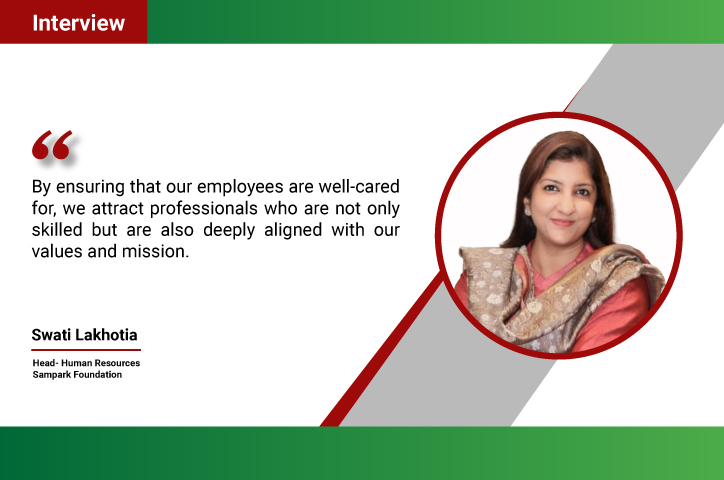In this exclusive interview, TheCSRUniverse engages with Swati Lakhotia, Head of Human Resources at Sampark Foundation, to explore the organization's employee-centric approach and its impact on their mission in primary education. Sampark Foundation, recognized as a Great Place to Work, has cultivated a dynamic and supportive work environment, transcending typical corporate practices to fit its non-profit ethos. Swati shares insights on the foundation’s internal metrics for employee engagement, sustainable practices to maintain a positive workplace culture, and how their certified status helps in attracting top talent. Additionally, she elaborates on the symbiotic relationship between a great workplace culture and the foundation’s innovative educational initiatives.
Read the full interview to discover how Sampark Foundation fosters a thriving internal community:
Q. Great Place to Work offers a valuable framework, but it's one data point. Does Sampark Foundation utilize additional internal metrics or surveys to measure employee engagement and well-being beyond the certification period?
A. Beyond the external recognition by Great Place to Work, we continuously assess internal dynamics through various employee-led forums and direct feedback mechanisms. This includes regular town halls, anonymous surveys, and direct communications with leadership, ensuring that employees' voices are not only heard but are a driving force behind organizational changes and policies.
Q. The press release emphasizes Sampark's mission in education. Can you elaborate on how the certified "great workplace" culture at Sampark translates into benefits for the foundation's core work of improving primary education? (e.g., increased staff retention, improved teacher training programs)
A. The "Employees First" approach (taken from Sampark Foundation’s CEO Vineet Nayar’s authored book, “Employees First Cutomer Second) directly translates into a passionate and committed workforce, which is crucial for achieving our mission of transforming primary education. When employees are supported and valued, they are more engaged and innovative, leading to more effective educational programs and higher impact in the communities we serve.
Q. Maintaining a positive work environment takes ongoing effort. Does Sampark Foundation have concrete initiatives in place to ensure the certified culture is not just a snapshot but a sustainable practice within the organization?
A.To ensure our certified culture is sustainable, Sampark Foundation has established several ongoing initiatives. These include leadership development programs at all levels, regular team-building activities, and a robust framework for continuous feedback and improvement. Our leadership is committed to being visible and accessible, reinforcing a culture of openness and trust.
Q. Great Place to Work often focuses on for-profit businesses. How does Sampark Foundation adapt best practices from the corporate world to create a thriving workplace culture within a non-profit environment?
A. Adapting the best practices from the corporate world, we tailor them to fit our non-profit ethos, focusing on transparency, empowerment, and community. By putting employees first, we enhance their ability to serve our educational mission, thereby creating a ripple effect that benefits both our internal community and the broader ecosystems we engage with.
Q. Being certified can be a strong recruitment tool. Does Sampark Foundation anticipate an increase in qualified applicants due to the Great Place to Work recognition?
A. Being recognized as a Great Place to Work serves as a testament to our employee-centric approach and enhances our attractiveness as an employer. We anticipate an increase in interest from potential applicants who are aligned with our values and motivated by our mission, seeing the certification as a testament to our commitment to providing a supportive and dynamic work environment.
Q. Sampark's work in education is well-known. Will the foundation consider sharing its learnings about fostering a positive workplace culture with other non-profit organizations?
A. In line with our founder's philosophy, we believe in the power of sharing knowledge and best practices. We are keen to share our learnings and strategies for creating a positive workplace culture with other non-profits, to help elevate the sector collectively.
Q. The non-profit sector can face challenges attracting top talent. How does Sampark Foundation use its certified culture to compete with for-profit businesses for skilled employees with a passion for their mission?
A. Our certified culture is a significant asset in attracting top talent, even in competition with for-profit businesses. We emphasize the impact and fulfillment that come with our roles, alongside competitive benefits and professional development opportunities. Also by ensuring that our employees are well-cared for, we attract professionals who are not only skilled but are also deeply aligned with our values and mission.
Q. Great workplaces are often built on employee participation. Does Sampark Foundation have initiatives that encourage employee ownership and contribution to shaping the positive work environment?
A. We actively foster an environment where employees are encouraged to take ownership of the culture and contribute to its development. This participatory approach ensures that our workplace environment continuously evolves in alignment with the needs and aspirations of our team members.
Q. Sampark's work in education emphasizes innovation. Does the certified culture translate into fostering a culture of innovation within the foundation itself, leading to new ideas and approaches to achieve their educational goals?
A. Innovation is at the heart of Sampark Foundation, and by prioritizing our employees, we empower them to bring forward new ideas that can transform educational practices. This culture of innovation is not just about new products or services but also about innovative ways of engaging with and supporting our communities.


















.jpg)



